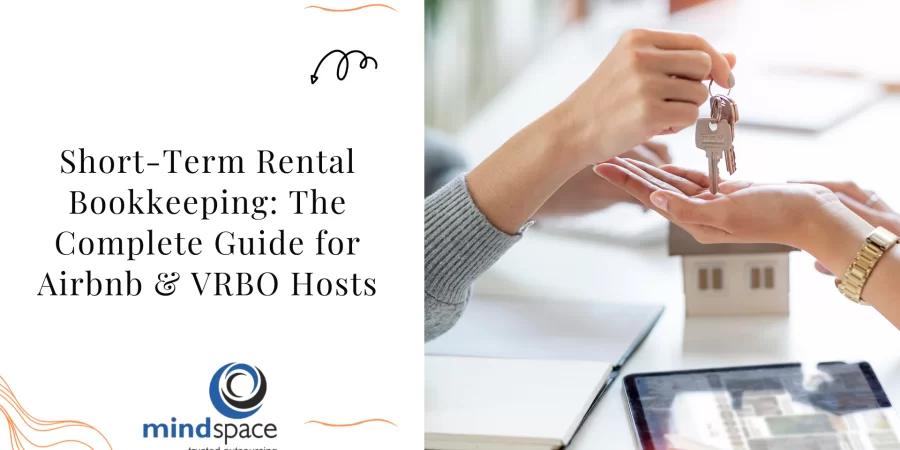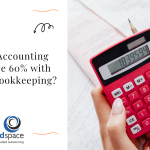Short-Term Rental Bookkeeping: The Complete Guide for Airbnb & VRBO Hosts
Short-term rentals have moved far beyond being a side income. For many property owners and operators, platforms like Airbnb and VRBO now represent structured, revenue-driven businesses. As income grows, financial complexity grows with it. That is where short term rental bookkeeping becomes a critical foundation rather than an optional task.
Accurate bookkeeping ensures financial clarity, tax readiness, and operational control, especially in an environment where nightly rates, seasonal demand, platform fees, and local taxes constantly shift. Mindspace Outsourcing supports rental operators by bringing structure and reliability to this fast-moving segment.
Why Bookkeeping Matters in the Short-Term Rental Model?
Short-term rental income behaves differently from traditional long-term leasing. Payments arrive frequently, expenses fluctuate monthly, and tax obligations vary by location.
Without structured bookkeeping, hosts often face:
- Inaccurate profit tracking
- Missed expense deductions
- Difficulty reconciling platform payouts
- Errors during tax filing
Reliable bookkeeping converts transaction data into actionable financial insights, allowing rental operations to remain compliant and financially stable.
Core Financial Challenges Faced by Airbnb and VRBO Hosts
Short-term rental businesses handle far more transactions than conventional rentals. Each booking generates multiple financial entries, from guest payments to cleaning and service fees.
Common challenges include:
- Tracking income across multiple platforms
- Managing platform service charges
- Recording maintenance and operational expenses
- Handling occupancy-based local taxes
- Reconciling delayed payouts
This complexity is why many operators turn to short term rental accounting services to manage the volume without sacrificing accuracy.
Understanding Income Tracking for Short-Term Rentals
Revenue does not always equal payout. Platforms deduct service fees, apply refunds, and release payments after stays are completed.
Effective bookkeeping separates:
- Gross booking revenue
- Platform commissions
- Net payout amounts
- Refunds and chargebacks
This clarity prevents revenue overstatement and ensures financial reports reflect actual cash flow rather than projected earnings.
Expense Categorization That Impacts Profitability
Expenses in short-term rentals are frequent and varied. Proper categorization improves tax efficiency and long-term planning.
Typical expense categories include:
- Cleaning and laundry services
- Property maintenance and repairs
- Utilities and internet
- Furnishings and supplies
- Platform subscription fees
Accurate classification through bookkeeping for short term rentals ensures deductible expenses are captured correctly and consistently.
Managing Platform-Specific Bookkeeping Differences
Airbnb and VRBO operate with different fee structures, payout schedules, and reporting formats. Treating them identically often leads to reconciliation issues.
Dedicated airbnb bookkeeping processes address:
- Variable host and guest fee splits
- Multi-currency bookings
- Resolution center adjustments
By separating platform-specific workflows, financial reporting remains clean and audit-ready.
Tax Considerations Unique to Short-Term Rentals
Short-term rentals frequently trigger additional tax responsibilities beyond standard income tax.
These may include:
- Occupancy or lodging taxes
- Sales or tourism taxes
- State and city-level compliance requirements
Accurate bookkeeping ensures these taxes are tracked separately, reducing the risk of penalties and simplifying filings when tax season arrives.
Why Many Hosts Choose Outsourced Bookkeeping?
As rental portfolios expand, managing finances internally becomes time-consuming and error-prone. This is why many operators rely on outsourced bookkeeping services in USA that understand both regulatory expectations and platform mechanics.
Outsourcing allows rental operators to:
- Maintain consistent financial records
- Scale operations without hiring internally
- Reduce reporting errors
- Stay compliant across jurisdictions
The result is predictable financial oversight without operational strain.
Technology and Software Compatibility
Modern short-term rental bookkeeping integrates directly with accounting software such as QuickBooks and cloud-based property management tools.
Automated integrations enable:
- Real-time transaction syncing
- Automated bank reconciliations
- Standardized monthly reporting
This structured approach supports long-term growth and transparency, especially when combined with professional accounting services for short term rentals.
How Mindspace Outsourcing Supports Short-Term Rental Businesses?
Mindspace Outsourcing works with short-term rental operators as a back-office partner rather than a transactional service provider. Financial workflows are built around property portfolios, platform usage, and reporting requirements.
The focus remains on:
- Accurate transaction recording
- Platform-wise reconciliation
- Expense classification aligned with tax needs
- Secure data handling and reporting consistency
This approach allows rental businesses to focus on occupancy and guest experience while maintaining financial discipline.
Conclusion
Short-term rental success depends on more than bookings and reviews. Financial accuracy plays an equally important role in sustainability and compliance.
short term rental bookkeeping provides the structure needed to manage high-volume transactions, fluctuating expenses, and complex tax obligations. With the right systems and professional support, rental operators gain clarity, reduce risk, and create a stable foundation for growth.
FAQs:
Is short-term rental bookkeeping different from traditional rental accounting?
Yes. Short-term rentals involve higher transaction volume, platform fees, and additional tax considerations that require specialized bookkeeping processes.
How often should bookkeeping be updated for short-term rentals?
Monthly updates are standard, though high-volume properties often benefit from weekly reconciliation for accuracy.
Can bookkeeping handle multiple properties and platforms together?
Yes. Structured systems allow property-wise and platform-wise tracking within a single financial framework.
Are platform service fees considered deductible expenses?
In most cases, platform fees are treated as operating expenses and should be recorded separately for clarity.
Does outsourced bookkeeping reduce tax-time stress?
Accurate, up-to-date records simplify tax preparation and reduce the likelihood of filing errors or missed deductions.


